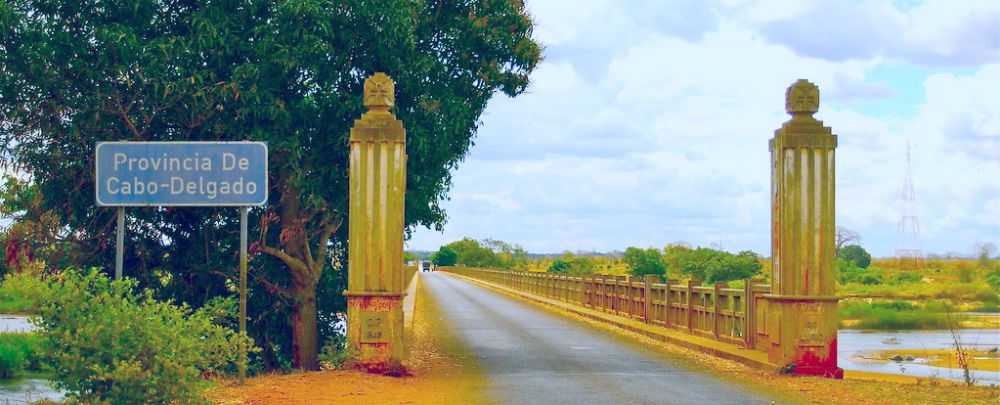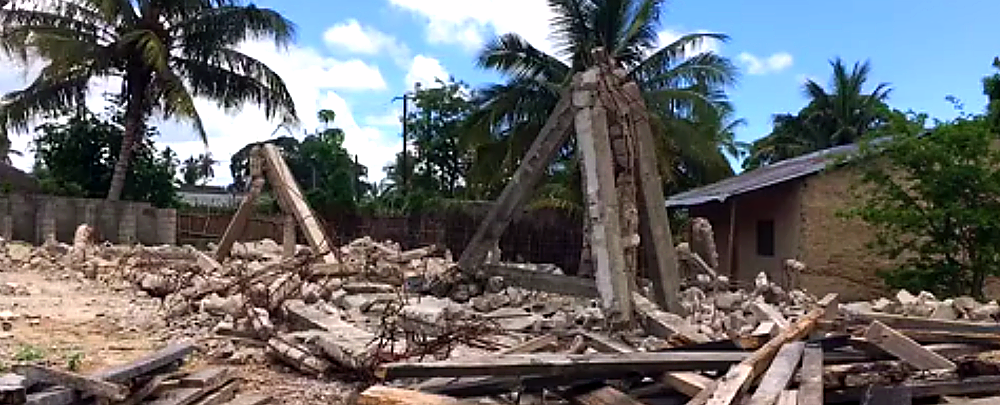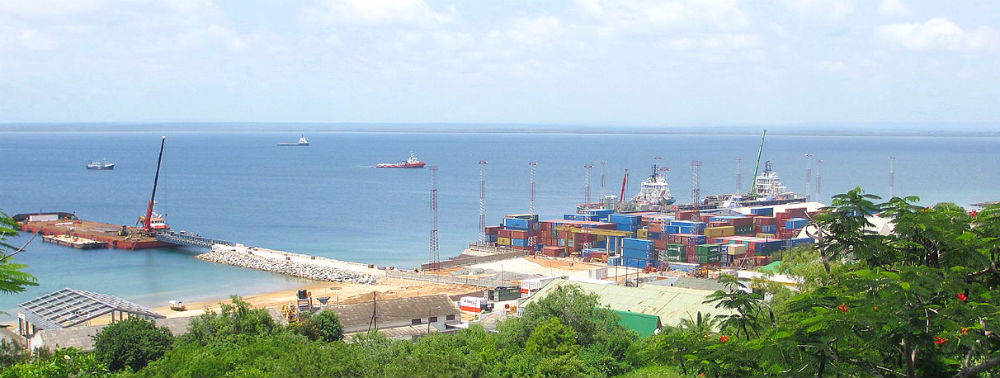
A sign on the border of Cabo Delgado province. (Photo: F Mira)
The armed Islamist movement in Mozambique’s northernmost province of Cabo Delgado, known locally as “al Shabaab” (no direct relation to the Somalian militant group) or “Swahili Sunnah” (the Swahili path), among other names, is responsible for over 100 deaths, destruction of property, and the displacement of thousands of people. The group first gained attention with an attack on a police station in October 2017. Inspired by the teachings of the late radical Kenyan preacher Aboud Rogo, the group was seen as young and brash—and at odds with the established Muslim Council in the region. Failing to win over the Muslim leadership, the group went on to establish its own mosques and madrassas and recruited from local youth by playing up feelings of disaffection.
Since May 2018, the group’s attacks have become less discriminate and more violent—to include beheadings. Numerous villages have been attacked, with over 1,000 homes burned or destroyed. Militants, moreover, are reported to have begun kidnapping women and girls.
The situation in northern Mozambique is complicated by a series of underlying factors—including competition over land, resettlement, and distrust of local political actors.
The group has also carried out an attack on a convoy transporting workers and goods for the multinational oil and gas company Anadarko, resulting in a temporary suspension of construction on its giant liquefied natural gas (LNG) plant in Cabo Delgado.
This insecurity and displacement are negatively impacting the local community and economic development within the region. This includes disrupting farming activities, which could further compound the crisis by impacting food security.
Heavy-handed responses by Mozambican security forces following extremist attacks have heightened distrust among local residents. According to Human Rights Watch, men found in Cabo Delgado villages by security forces have been rounded up and held in military detention without due process. These security responses are alleged to have contributed to further al Shabaab recruitment in the region.

Damage after an attack in northern Mozambique. (Photo: VOA)
The pattern of escalating violent extremist attacks followed by indiscriminate security responses have played out repeatedly elsewhere in Africa—Somalia, the Lake Chad Basin, the Sahel, and the Maghreb. The situation in northern Mozambique, however, is further complicated by a series of underlying factors—including competition over land, resettlement, and distrust of local political actors—that are fueling tensions and demanding a more comprehensive response.
Tensions over Land
The escalating attacks and harsh security responses have led residents to take to the streets in protest in the city of Palma. Among other grievances, protesters claim that the insurgent attacks are being supported by powerful Mozambican figures to drive local inhabitants off their land. It is believed locally that these politically well-connected actors will then claim possession and profit from the land, which is growing in value due to substantial foreign investments being made in Cabo Delgado. Although there is no known evidence to support this narrative, it speaks to the local population’s distrust of government and perception of the unfairness of Mozambique’s land tenure system that leaves them vulnerable to losing their land.
“Human rights abuses attributed to private security forces … reportedly fueled the armed Islamist group’s first attacks.”
The emergence of violent extremism in Cabo Delgado has occurred against a backdrop of increasing foreign economic engagement in the region. Human rights abuses attributed to private security forces hired by the multinational Gemfields, which holds a ruby-mining concession, reportedly fueled the armed Islamist group’s first attacks in Mocímboa da Praia in October 2017. In Montepuez District, these private security actors allegedly destroyed miners’ property, torturing and killing some residents, many of whom were artisanal miners, to force them to leave the company’s concession area. That district is home to the world’s largest ruby reserves.
Resettlement Exacerbates an Already Delicate Social Landscape
Anadarko, meanwhile, has obtained concessions from the Mozambican government to construct and operate one of the world’s largest LNG plants and develop a port capable of harboring vessels specially designed to transport LNG. As part of its engagement, Anadarko has sought to have a positive impact on local communities and contribute to the stabilization of the region, which will create a more secure operational environment.
The development of the LNG project, however, has entailed the resettlement of thousands of farmers and fishermen from the Afungi peninsula in the Palma District of Cabo Delgado. Anadarko’s stated goal has been to oversee resettlement in a way that restores or improves the standard of living of those displaced. However, despite the billions of dollars invested by major oil and gas companies in the region, the perception is that there has been little benefit to the local communities, most of which are Muslim. Instead, resettlement efforts may be precipitating some negative sentiments and heightening both long-term and short-term security risks. Interviews in Palma District reveal that some “resettled” youth have joined the ranks of al Shabaab.
Palma residents speak of widespread dissatisfaction with the implementation of the resettlement program and the impact this is having on communities in the area. Local community leaders have complained of the diversion of funds intended to assist the displaced population, inadequate payment for land, and lack of compensation for their investment in fruit-producing trees. Moreover, community leaders say that some resettled households were mixed in with communities that they did not know, and reported that fisherman were often settled inland and as a result lost their livelihoods.
“The development of the LNG project, however, has entailed the resettlement of thousands of farmers and fishermen … resettlement efforts may be precipitating some negative sentiments and heightening both long-term and short-term security risks.”
The program is also raising tensions between those being displaced and the donos de terra, (a concept that refers to the first lineages to have historically settled an area and who possess certain rights, including that of political deference). A second group called vientes are regarded as more recent arrivals who traditionally negotiate with the donos de terra for use of the land. A third group, the epothas, are descendants of slaves who have no right to land and must work as sharecroppers on the land possessed by the donos de terra and the vientes.
Also complicating the local population’s perception of resettlement is its history of villagization schemes during Mozambique’s war of independence. The Portuguese colonial military attempted to bring scattered households into concentrated villages to enhance monitoring and prevent local populations from harboring fighters of the Mozambican national liberation movement, Frelimo, which was based in neighboring Tanzania.

A pipeline carrying natural gas from Mozambique to South Africa. (Photo: Panos / Trygve Bolstad)
Once pro-independence forces succeeded in gaining control of Cabo Delgado Province, they implemented their own villagization project as a method of rural development and political mobilization. In addition, many of the refugees who had fled to Tanzania during the anti-colonial struggle were resettled in Cabo Delgado. The memories from these traumatizing villagization and resettlement schemes from the 1960s and 1970s remain vivid in the collective memory of the rural populations.
Further confounding the resettlement scheme is Mozambique’s legal land tenure system, under which many among the resettled population say the state fails to protect their interests. The state is owner of the land and occupants of the land have the right of usage and improvement of land. In practice, according to a USAID assessment, smallholder “land rights remain vulnerable to capture by elites who often enjoy state support on the grounds that they have greater capacity than smallholders to bring unused resources into production. These conditions make it difficult for communities and individual landholders lacking formal land documentation to defend their land rights against third parties, make long-term investments in their land, or meaningfully engage in negotiations with the private sector.”
According to interviewees in Cabo Delgado, the disputes among the local population over land use have contributed to the inability of many of those displaced by the Anadarko resettlement from maintaining livelihoods. Violent attacks on local communities by the jihadists, in part, likely reflect revenge killings motivated by the disputes over land access and perceptions of social status.
Organized Crime, Corrupting Influences, and Public Distrust
The presence of organized crime networks in Cabo Delgado and nearby provinces has also contributed to the instability. These networks have been involved in the illicit trade in wildlife, timber, gems, gold and narcotics including heroin as well as human trafficking. The corruption that the organized crime promotes, reportedly ensnaring state actors including the police, has exacerbated the public’s distrust of government, feeding a narrative that the government is not on the side of populace.
Mohamed Bachir Suleman, a large-scale Mozambican narcotics trafficker who the U.S. government designated a drug kingpin in 2010, pursuant to the Foreign Narcotics Kingpin Designation Act, reportedly wields influence among certain political and religious figures in Cabo Delgado and elsewhere in Mozambique.
“The corruption that the organized crime promotes, reportedly ensnaring state actors including the police, has exacerbated the public’s distrust of government.”
Tanzanians, as well as nationals from Mali, Ethiopia, the Democratic Republic of the Congo, Rwanda, Somalia, Nigeria, and Cameroon, are among the Africans involved in northern Mozambican criminal markets. South Asian (heroin), Chinese (timber and ivory), and Thai (gems) criminal groups are also active in this region. The maritime trade route transports drugs produced in Afghanistan along the East African coast from Somalia to northern Mozambique. Some of the heroin enters Mozambique via the port of Pemba in Cabo Delgado and that of Nacala in neighboring Nampula Province.
There is also evidence that larger shipments of heroin enter Mozambique by road from Tanzania and Kenya. The drug traffickers rely on bribery and a general lack of law enforcement. The heroin arriving by road and in the ports are then shipped by road to South Africa and much of it on to Europe. While there have been claims that the jihadists benefit from participation in the illicit trade, the evidence for this is not been verifiable.
The arrest of several Ugandans in northern Mozambique on terrorism charges has fueled speculation of links to global jihadist networks given that an extremist group operating on the Congo/Uganda border, the Allied Democratic Front, has pledged allegiance to ISIS. However, some of the arrested Ugandans said that they are members of al Shabaab in Uganda. The first use of an improvised explosive device (IED) in Cabo Delgado on March 20, 2019, which reportedly killed several soldiers, has raised further questions over whether Mozambican jihadists have received training from outside operatives.
Finding a Way Forward
The rise of militant Islamist extremism in northern Mozambique is a multifaceted phenomenon. While external ideological influences and spoilers may have triggered the violence, support for this movement is fueled by resentment over resettlement, human rights abuses by security forces, and lack of land rights for smallholders in this region. The distrust of government, corruption, and the impact of foreign investment pose challenges to finding solutions capable of stabilizing Cabo Delgado and improving the lives of the population. The adoption of negative popular narratives regarding government, political figures, and international investors appear to be further drivers of VEO recruitment.
Given these circumstances, the government is challenged to devise a careful response to this militant Islamist threat. A continued heavy-handed intervention by government security forces will likely lead to further radicalization and tension. On the other hand, downplaying the situation by calling it “banditry,” as government representatives have done, and ignoring the broader narrative of socioeconomic grievances also risks driving the problem deeper.
Finding common ground from which to build trust will be no simple task. To do so will require facilitated community dialogues among a broad spectrum of traditional, faith-based (Muslim and Christian), and community leaders that include women and youth, government and administrative officials, educators, security personnel, and health providers.

The port of Pemba, capital of Cabo Delgado province. (Photo: Ton Rulkens)
Luis Fernando, the Roman Catholic Bishop based in Pemba, the capital of Cabo Delgado, frames the effort to counter violent extremism in the province as an issue of social justice. In a pastoral letter issued in June 2018, Bishop Fernando noted that the province is one of the poorest in Mozambique. He added that the province’s natural wealth can generate employment, stability, and hope among youth if the economic development takes this into account. The population of the region and the nation will benefit from investments that are well managed, shared, and monitored.
Increased community participation will be vital in social and economic problem-solving, the resolution of issues arising out of resettlement, and the oversight of policing. To do so, public officials will have to be trained in how to communicate with the public in ways that make the public feel heard and respected. Likewise, local media, especially community radio, can be a valuable ally in community problem-solving and the promotion of civic engagement. These will include finding ways to mainstream positive narratives within existing social networks, coupled with tools for improving community civil behavior and discourse. A similar participatory approach has been effectively deployed in parts of Cabo Delgado to protect forested environments.
These types of community participatory methods, many of which are best practices used in the field of social and behavior change communication, can help to improve the provision of public services, increase trust in government, reduce corruption, and limit the narrative and drivers of violent extremist recruitment.
Greg Pirio and Robert Pittelli are the President and Associate of EC Associates, respectively. Yussuf Adam is an Associate Professor of Contemporary History at the University of Eduardo Mondlane, Maputo, Mozambique.
Additional Resources
- Paul Nantulya, “The Ever Adaptive Allied Democratic Forces,” Spotlight, Africa Center for Strategic Studies, February 8, 2019.
- Africa Center for Strategic Studies, “Militant Islamist Group Activity in the Sahel Rises,” Infographic, October 29, 2018.
- Simone Haysom, Peter Gastrow, and Mark Shaw, “The Heroin Coast: A Political Economy along the Eastern African Seaboard,” ENACT, Issue No. 4, June 2018.
- Gregory Pirio, Robert Pittelli, and Yusuf Adam, “The Emergence of Violent Extremism in Northern Mozambique,” Spotlight, Africa Center for Strategic Studies, March 25, 2018.
- Abdisaid M. Ali, “Islamist Extremism in East Africa,” Africa Security Brief No. 32, Africa Center for Strategic Studies, August 9, 2016.
More on: Countering Violent Extremism Mozambique

